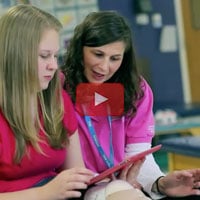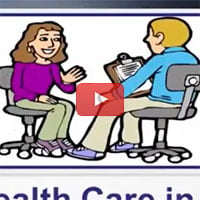Health Transition Planning and
the Individualized Education Program (IEP)
According to the Individuals with Disabilities Education Act (IDEA), the purpose of special education services is to ensure that children with disabilities have available to them a free appropriate public education designed to meet their unique needs and prepare them for further education, employment and independent living. A student’s elementary education provides the foundation for achieving these goals.
Beginning in middle school and throughout high school, however, a student’s Individualized Education Program (IEP) goals and transition planning activities increasingly focus on building the skills needed to achieve each student’s goals for life after high school. Parents, youth and the entire IEP team will want to consider how health and healthcare issues impact a student’s ability to achieve his or her postsecondary education, employment, and independent living goals.
What skills will your student need to develop to manage
their health condition and maintain the best possible health status?
The following transition planning questions can help parents determine what kinds of health-related goals and activities should be included in their son or daughter’s IEP and transition plan. See PACER’s Health Knowledge, Skills & Abilities Assessment [Link to form].
- Will he be able to take care of himself, and have his health care needs met?
- Where does he or she plan to live?
- Will she or he pursue additional education, or want to work after high school?
- What are his or her interests? How will these be incorporated into his or her life?
- Can he or she learn to advocate for himself or herself?
- What kinds of supports will be needed?
Although the answers to these questions may change as your teen matures and learns more about the potential long-term impact of his or her disability, they will help you identify short- and long-term health related goals that are important to your son or daughter’s future employment, independence and community participation. Consider whether any of the topics below reflect skills that should be addressed in your youth’s IEP. Discuss areas you see as needs and how related goals might be incorporated into the IEP with your youth and the IEP team.
Examples of health–related IEP considerations
Organizational skills
- Is your youth able to plan ahead? For example, when completing a process such as planning a meal, refilling a prescription, or scheduling an appointment, can she organize the steps in a logical order?
- Does your teen or young adult know how to find and sort or file their medical information?
- Does he or she know how to schedule an appointment?
Self-Management
- Does your teen or young adult think about questions to ask the doctor before each visit? Does he or she remember to them?
- Does your youth see the doctor alone for at least part of the visit?
- Does your youth take responsibility for taking medication or doing the treatments (e.g. urinary catheter, asthma treatments, etc.) prescribed by their doctor?
- Does your youth know common complications of his or her condition or disability and the symptoms that he or she should seek immediate help for (urgent care, emergency room, or 9-1-1)?
Self-Advocacy
- Is your teen or young adult able to describe his or her condition/disability and medical needs to others?
- Does your youth understand how his or her condition will affect the activities he or she plans to pursue after high school?
- Is he or she ready to request accommodations in postsecondary education, employment, volunteer work and other community settings if needed?
Managing emotions
- Can your youth recognize his or her feelings such as happiness, sadness, anger or frustration?
- Does he or she have a plan to cope with different feelings in various settings?
Transportation
- What transportation options are available to your youth – to medical appointments and in general?
- Is driver’s education appropriate?
- If your youth will use public transportation, will she or he also need mobility training to learn how to understand transit schedules, read a map, and navigate unfamiliar neighborhoods?
Cooking and cleaning
- Does your teen or young adult know what constitutes good nutrition?
- Can your youth read a recipe or find one online?
- Can he or she make a grocery list and shop for ingredients?
- Can he or she follow basic cooking instructions?
- Does she or he have the skills to keep the kitchen clean and understand the potential health consequences of not doing so?
- Does he or she know how to safely operate home equipment (e.g. electric teapot, stove, or vacuum)?
- Does she or he know how to safely use common household cleaners?
Emergencies
- Does your youth know what to do in case of a fire, power outage, or weather emergency?
- Does your family have an emergency preparedness plan?
- Does your youth have a health insurance card with him or her at all times?
- Does your youth have a medical alert bracelet, a list of people to contact in an emergency or keep a portable medical summary with him or her at all times?
Money management
- Does your son or daughter know how to pay for a prescription or a co-pay fee at the time of a medical appointment?
- Can your youth explain basic insurance principles such as deductibles and co-pays?
- Does he or she understand why one needs to carry an insurance card, and when it will be needed?
Sample Medical Summary
and Emergency Plan
Take a look at a sample medical summary and emergency plan available from Got Transition™, a National Health Care Transition Center with numerous resources for families, youth and the medical professionals who work with them.
Emergency Medical Record card from PACER
Pocket- or billfold-sized card with plastic case to fill out with personal and medical information in case of emergency.
Free to Minnesota parents of youth with disabilities, one per child.
$1.50 | HIAC-h21
Order here
Financing Your Young Adult’s Healthcare
- Do you and your youth know how long he or she will be covered under your family’s insurance plan?
- If your child currently receives healthcare covered by a government program, will he or she be covered as an adult?
- After she or he turns 18, will your youth be prepared to manage their own healthcare, independent living, and financial affairs with informal assistance from family, friends, and others?
- Does he or she need a representative payee to act as the receiver of Social Security Disability or Supplemental Security Income?
Decision-making
- Is a healthcare power of attorney needed for your son or daughter – or would other informal ways of providing support for healthcare decisions help your youth to continue to grow his or her executive functioning skills?
What's Next
Once you have identified the issues your son or daughter needs to focus on, think about how they could be incorporated into the IEP. Here are some examples of skills that could be addressed in the IEP.
- Keep and follow a calendar
- Practice making an appointment, and arriving on time
- Ask if the school nurse would be a resource to teach your youth about their specific medications, including the drug names, indications, dosage, and possible side-effects
- Learn about basic insurance principles such as deductibles and copays
- Learn why one needs to carry an insurance card and how much money will be needed to pay at the time of the medical appointment
- Learn when and how to order refills, and how to pay for the medications
- Practice ordering a prescription refill
Revisit areas where additional practice is needed to ensure competency.
Videos

Becoming an Adult: Taking Responsibility for Your Medical Care

Health Care in the Transition Plan

Dr. Right: The Right Way to Discuss Transition

Dr. Knotright: The Wrong Way to Discuss Transition
For more videos on this topic, visit our Videos page.
PACER Resources
- What Does Health Have to Do with Transition? Everything!
This Parent Brief developed by PACER for the National Center on Secondary Education Transition (NCSET) provides information on the benefits of and strategies for including health in the Individualized Education Program (IEP) process. - Transition Health Plan for Youth with Disabilities and Their Families
This form is designed to help transition-age youth with disabilities and their families plan for youth to assume greater or full responsibility for their adult health care. - Preparing for Adulthood: Taking Charge of My Own Health Care
This 4-part series on transitioning from pediatric to adult health care was developed by PACER’s Youth Advisory Board.
National Resources
- Helpful Tools for Youth and Families from GotTransition.org
- Getting Ready for Healthcare at the Age of Majority
This tip sheet developed by the National Secondary Transition Technical Assistance Center and the National Post-School Outcomes Center offers helpful strategies for providing supports and notes both the pros and cons of guardianship. - Transition Quick Guide: Take Charge Of Planning And Managing Your Own Health And Career Goals
This information is for youth and young adults from age 12-30. Because the ability to manage one’s health and wellness is critical for youth with disabilities and chronic health conditions, planning health and career goals should go hand in hand. This checklist provides information and resources about health insurance coverage, self-care, health care transition, decision-making, and career planning and management. - Making the Move to Managing Your Own Personal Assistance Services (PAS): A Toolkit for Youth with Disabilities Transitioning to Adulthood
This toolkit designed to help transition-age youth with significant disabilities, as well as their family and friends, navigate the complex world of personal assistance services (PAS). It provides effective strategies that can easily be adapted to individual situations to help youth with significant disabilities as they progress toward a life of increased independence.

